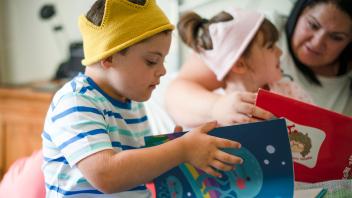As regular readers know, this is the time of the year that I identify charities that try to help improve children’s literacy and language and to make books available to kids. Readers of my blog obviously care about whether kids can read and why not make that cause part of your charitable gifting as well.
Each year, I comb through Charity Navigator to identify appropriate literacy-focused charitable agencies. I look for national and internationals groups that are rated as 3- and 4-star charities (that means they are spending at least 80% of the contributions on services).
Please consider any and all of these literacy-oriented charities. They all do terrific work and could use your help at this time of the year.
Books for Africa . Founded in 1988, Books for Africa (BFA) collects, sorts, ships, and distributes books to children in Africa. Its goal is to end the book famine in Africa. Books donated by publishers, schools, libraries, individuals, and organizations are sorted and packed by volunteers who carefully choose books that are age and subject appropriate. They send good books, enough books for a whole class to use. Since 1988, Books for Africa has shipped more than 27 million books to 48 African countries. These books are on once-empty library shelves, in classrooms in rural schools, and in the hands of children who have never before held a book. Each book will be read over and over again. When the books arrive, they go to those who need them most: children who are hungry to read, hungry to learn, hungry to explore the world in ways that only books make possible.
Children’s Literacy Initiative (CLI) , founded in 1988, works with teachers to transform instruction so that all children can become powerful readers and writers. CLI’s goal is to close the gap in literacy achievement between disadvantaged children and their more affluent peers. CLI offers professional development for pre-kindergarten through third grade teachers across the country. They provide coaching and seminars, lesson plans, a prekindergarten curriculum, and collections of high-quality children’s literature. Their programs promote research-based methods for teaching reading and writing. CLI is involved in large projects in the public school systems of Philadelphia, Newark (NJ), Camden, Baltimore, and Boston.
First Book . First Book has distributed more than 100 million books and educational resources to programs and schools serving children from low-income families throughout the United States and Canada. By making new, high-quality books available on an ongoing basis, First Book is transforming the lives of children in need and the elevating the quality of education.
Jumpstart. Jumpstart is a national early education organization working toward the day every child in America enters school prepared to succeed. Jumpstart delivers a research-based and cost-effective program by training college students and community volunteers to serve preschool-age children in low-income neighborhoods. Through a proven curriculum, these children develop the language and literacy skills they need to be ready for school, setting them on a path for lifelong success. Jumpstart is a proud member of the AmeriCorps national service network.
Reach Out and Read . Founded in 1989, Reach Out and Read prepares America’s youngest children to succeed in school by partnering with doctors to prescribe books and encourage families to read together. Doctors, nurse practitioners, and other medical professionals incorporate Reach Out and Read’s evidence-based model into regular pediatric checkups, by advising parents about the importance of reading aloud and giving developmentally-appropriate books to children. The program begins at the 6-month checkup and continues through age 5, with a special emphasis on children growing up in low-income communities. Families served by Reach Out and Read read together more often, and their children enter kindergarten with larger vocabularies and stronger language skills, better prepared to achieve their potential. Currently, more than 27,000 doctors and nurse practitioners at 4,600 hospitals, health centers, and clinics participate in Reach Out and Read, serving nearly 4 million children and families nationwide.
Room to Read believes that World Change Starts with Educated Children. They envision a world in which all children can pursue a quality education that enables them to reach their full potential and contribute to their community and the world. Room to Read seeks to transform the lives of millions of children in developing countries by focusing on literacy and gender equality in education. Working in collaboration with local communities, partner organizations and governments, Room to Read develops literacy skills and a habit of reading among primary school children, and support girls to complete secondary school with the relevant life skills to succeed in school and beyond.
United Through Reading (UTR) . The mission of UTR is to unite military families facing physical separation by facilitating the bonding experience of reading aloud together. In 200 locations worldwide on land and at sea, UTR offers military service members the opportunity to be video-recorded reading books to their children at home. When faraway parents read stories to their children and send the video recordings home: children’s anxieties are eased; spouses at home are supported; parenting is shared; service members’ morale is boosted; service members’ are a part of daily life at home; homecomings are easier and more joyful; and children become readers.
About the Author
Publication Date
November 19, 2015

